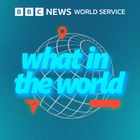
What in the World
Jan 27, 2025
2025 marks 80 years since the liberation of the Auschwitz-Birkenau death camp. It was at the centre of the Nazi campaign to eradicate Europe's Jewish population, and almost one million of those who died there were Jews - but Poles, Roma and Russian prisoners of war, among many others, also perished at the camp.
Memorials, historical documentation and testimony from survivors help preserve this troubled history. But disinformation and cultural amnesia mean many people deny that the Holocaust happened.
We hear from BBC presenter Jordan Dunbar, who visited the Auschwitz-Birkenau camp in Poland for a BBC documentary. He has been speaking to survivors of the Holocaust. He tells us about how this disinformation is spreading online, and what’s being done to preserve accurate accounts of history.
Plus, we also hear from Andy Pearce, an associate professor and historian at University College London’s Centre for Holocaust Education, about how to approach conversations where Holocaust misinformation or denial is present.
Instagram: @bbcwhatintheworld Email: [email protected] WhatsApp: +44 0330 12 33 22 6 Presenter: Hannah Gelbart Producers: William Lee Adams, Benita Barden and Emilia Jansson Editor: Verity Wilde

